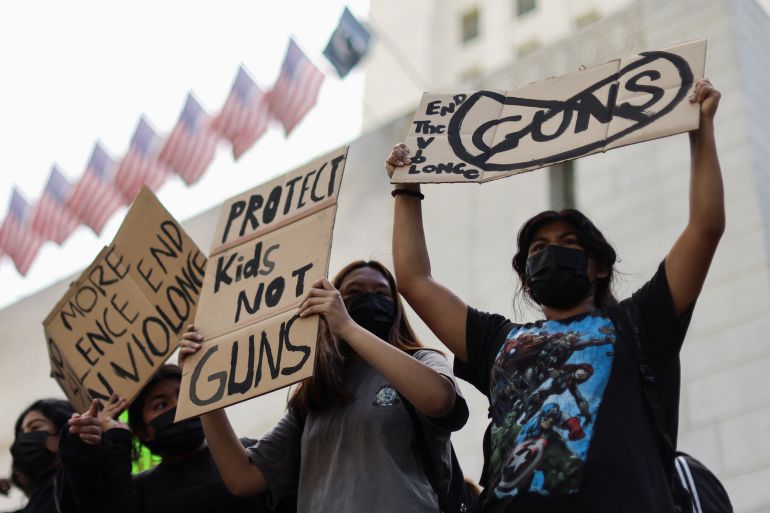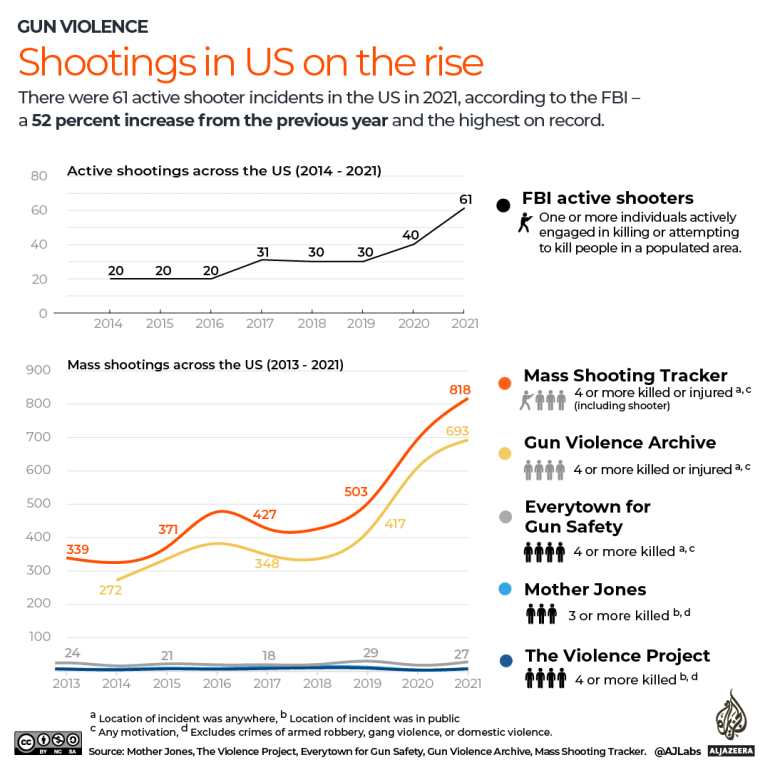US Congress mulls action on gun control following mass shootings
Senators report progress in bipartisan talks on potential reforms, but Republican opposition may prove insurmountable.

Washington, DC – Mark Barden has seen moments like this come and go – times when he thought the US Congress might finally pass gun reforms to thwart more mass killings.
But although none of these efforts have succeeded, Barden, who lost his seven-year-old son Daniel in the 2012 Sandy Hook massacre, remains optimistic that the time is near. A recent spate of mass shootings in the country, and especially the tragic killing of 19 students and two teachers at an elementary school in Uvalde, Texas, must be the catalyst for reforms, he told Al Jazeera.
Keep reading
list of 3 items‘Enough’: Biden tells lawmakers to pass gun control laws
Ohio law would arm teachers after 24 hours of training
“This is a very important moment,” said Barden, who cofounded the Sandy Hook Promise Action Fund to push for solutions to prevent future mass shootings. “We have to as a nation collectively encourage them, demand them, implore them to step up, do their job, because that is what they were elected to do.”
But while the Uvalde shooting and other recent tragedies have sparked new bipartisan efforts to find agreement on gun-control measures, experts say any proposal would have to be limited in scope to pass both houses of Congress. The odds of meaningful reform are thus slim.
Ongoing talks on gun legislation among a group of Republican and Democratic senators are not contemplating major initiatives, such as banning assault rifles or raising the minimum age to buy one. Instead, they are focused on narrower issues, such as “red flag” laws, which allow for the removal of firearms from anyone who may pose a danger to themselves or others. Modest reforms to background checks and increased spending on mental health and school safety are also under discussion.
“That would not be enough, and that would not be acceptable to Democrats,” Democratic strategist Maria Cardona told Al Jazeera.
Senators involved in the talks have reported progress towards a possible agreement, but acknowledged a lot more work is ahead of them.
“We are making rapid progress toward a common-sense package that could garner support from both Republicans and Democrats,” Republican Senator Susan Collins said in a statement last Wednesday.
Senator Chris Murphy, the lead Democratic negotiator in the talks, said an agreement must be reached within the next five days because of a deadline set by Senate Majority Leader Chuck Schumer.

“It’s frankly a test of democracy,” Murphy told CNN on Sunday. “It’s a test of the federal government as to whether we can deliver at a moment of just fierce anxiety amongst the American public. So we’re closer than ever before. Let’s see if we land it.”
Major hurdle in the Senate
In the wake of the Uvalde massacre, polls show that Americans overwhelmingly support major gun reforms. A total of 88 percent strongly or somewhat support background checks for all gun sales, including those at gun shows, and 67 percent strongly or somewhat support a ban on assault-style weapons, according to a Politico/Morning Consult survey conducted on May 25.
“We’ll have to see what the current group of senators produces and if it can pass. The sense is on Capitol Hill that the more narrow and specific, the better – but we have to wait and see,” Republican analyst and onetime Capitol Hill aide Doug Heye told Al Jazeera.
At the same time, the House of Representatives is taking up major legislation, including provisions to raise the age to buy certain semi-automatic rifles from 18 to 21, and to restrict the sale of large-capacity ammunition magazines – but such measures have no chance of approval in the Senate.
Gun-control proponents point to the rising number of mass shootings in the US as proof of the need for a major legislative overhaul. According to the nonprofit research group Gun Violence Archive, there have been more than 240 mass shootings this year, more than 30 of which have taken place since the May 24 Uvalde tragedy.
US President Joe Biden made a forceful argument for reforms, including a ban on assault rifles, in an address to the nation last Thursday, saying: “For God’s sake, how much more carnage are we willing to accept? … It’s time for the Senate to do something.”
With Schumer determined to hold a vote on the issue soon, Cardona noted: “That vote will either be a vote on a compromise bill, which would be great, or it will be a vote on a bill that Republicans block – not a good look for them going into the midterms and [amid] the outcries from Americans to do something.”
For a bill to get through the Senate, it must win the support of not just a majority of senators, but of at least 60 – a major hurdle that explains why recent efforts have failed. Since Democrats control just 50 Senate seats, any gun-control measure needs the backing of at least 10 Republicans, most of whom oppose major changes, citing the need to protect Second Amendment rights.
Opponents have also argued that stiffer gun-control laws would not prevent mass shootings, instead pointing to issues such as mental health and school safety. Senate Minority Leader Mitch McConnell has said the latter two are “what we need to target”, noting last Thursday: “I’m hopeful and optimistic that we can [pass bipartisan legislation], but I, like most of you, believe this needs to be done and must be done consistent with the Constitution.”
Still, Barden of the Sandy Hook Promise Action Fund holds out hope for gun reforms, saying Republican legislators need to take into account the public mood. In the meantime, he is continuing his advocacy work, including teaching students how to look out for warning signals that could presage a school shooting. More training within communities is needed to help address the plague of gun violence, he said.
“We can prevent a lot of these tragedies from happening,” Barden said. “There are always warning signs, and that is what drives my work.”